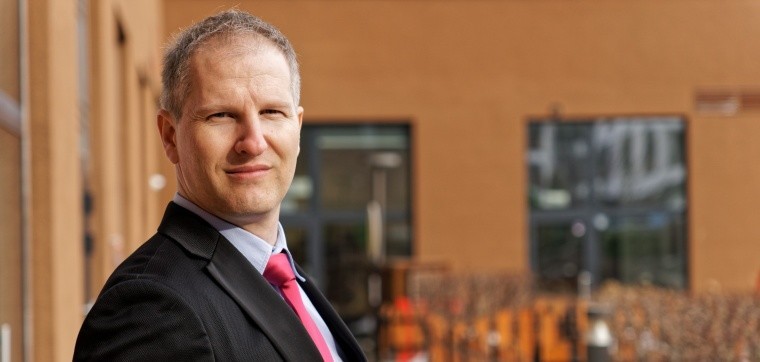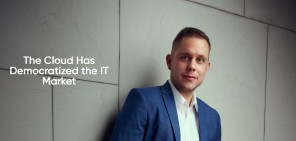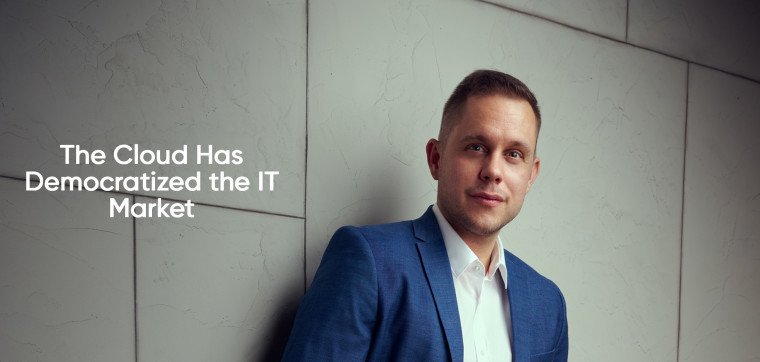In the ever-evolving landscape of Eastern European IT solutions, Noventiq is a beacon of excellence. We recently had the opportunity to catch up with Nikolay Dinev. As he marks one year as Services Director EE, we delve into the complexities of the Eastern European IT market and Noventiq's remarkable results within the region.
You’ve been celebrating the one-year anniversary of your promotion to Services Director for Eastern Europe. Can you explain how this role differs from your previous position as Services Lead?
Around five years ago, I embarked on a journey to build a full-service organisation. As our team grew and our IT service portfolio expanded, it became evident that a strategic shift was in order. With a team of 15 professionals under my guidance, my role evolved into a concentrated focus on solution selling, i.e. finding successful solutions, selling services and managing my team. Selecting the solutions and services that will be really needed in the market is becoming a challenge for solution providers. Therefore, it is necessary to find the services with the most significant potential that customers will need professional service and to prepare the services and delivery team to serve these needs. Today, my role is less consumed by the day-to-day operational grind, a testament to the competence of my team. This allows me to concentrate on personnel management, strategic IT decisions, and pioneering innovative IT solutions.
What is your perspective on the Eastern European market, and how does Noventiq assist companies?
The Eastern European market presents a unique landscape characterised by medium-size countries which all have different languages and varying stages of development among companies. This diversity poses a challenge, as servicing these companies from external resources often require language-specific skills and tailored services. We aim to harness the potential of Noventiq's slogan, 'Global Expertise, Local Outcomes' which means that we are able to operate at a local level to achieve our local goals, but bringing 30 years of global expertise in IT and the support of a global team based in 60 countries worldwide. There are countless examples where we have managed to do exactly that, achieve local outcomes by using our global expertise, and we take great pride in the results.
You've mentioned the varying stages of development among Eastern European companies. Can you elaborate on this and how Noventiq aids these companies?
Eastern European companies can be broadly categorised into three groups. Some are grappling with the complexities of digitalisation, often hindered by a need for more understanding regarding the advantages of digital technologies. In these cases, education is pivotal. Our strategy is demonstrating the benefits of cloud services and making the value of the cloud tangible through straightforward IT processes, such as digital operations or transforming document management systems. Another group, often global IT enterprises, is relentlessly seeking and adopting cutting-edge digital technologies on a large scale. These entities are well-versed in the benefits of the public cloud and usually have in-house IT engineering teams. Here, the challenge lies in understanding the latest IT technologies and successfully integrating them into our customers’ IT infrastructure which typically seek advanced, custom IT solutions for their companies. The third group is in a transitional phase, maintaining existing technology but gradually embracing cloud services. Their interest in cloud services is conditional upon recognising clear economic and business advantages. The majority of IT companies fall into this category.
Noventiq's role for these three groups of customers and situations is very similar. First, we understand the challenge the customer is facing independently of the company’s size or location. Then, we find the right cloud solution for them and provide our services to implement that solution, and afterwards, we offer our management services to make sure their IT systems will continue to operate in the most efficient and secure way. We guide these companies through their digital transformation.
You've emphasised the role of solution providers. How does Noventiq enable companies to maximise the value of the services they receive?
To be an effective IT solution provider, our primary objective is to understand the most pressing IT challenges within an organization. That's why I teach my team to listen and ask questions during the initial meetings, rather than talking. Often, IT solution providers need to grasp the customer's specific pain points before diving prematurely into proposing solutions. When we understand where they need our help the most, we can become a truly trusted advisor in the long term. The complexity lies in the diversity of needs within an organization. This necessitates not only conversations with top management but also with operational IT teams, end-users, and IT personnel. What makes Noventiq truly exceptional is its global IT reach. We offer our customers global IT expertise, knowledge, and a wide range of IT services across various regions and countries.
Where do you envision services and solutions heading in the future?
The future of IT services and solutions will be marked by focusing on addressing specific customer issues and enhancing business value. One notable area of expansion is Artificial Intelligence (AI). Both IT service providers and customers are increasingly exploring the potential of AI. In the years to come, we can expect more companies to adopt AI-driven IT features. It is anticipated that only a small fraction of companies, perhaps 10-20%, will invest in building their own AI or machine learning models, mainly due to the high costs and the readily available AI features cloud service providers offer. Most companies will opt for off-the-shelf cloud AI service like – generative AI, cognitive services provided by cloud providers to enhance their products or services. In this rapidly evolving landscape, Noventiq's Eastern European IT team boasts highly qualified cloud solution architects ready to help organisations identify suitable use cases and implement appropriate AI solutions.
Another critical area to emphasise is cybersecurity. As the IT threats organisations face evolve and diversify, the importance of IT security continues to grow. Companies will consequently increase their IT defences and investments in cybersecurity. A notable trend will be ongoing IT security education to empower employees to recognise and mitigate IT security threats such as phishing attacks. Mature organisations no longer consider it important to ask for training from Noventiq to employees in cybersecurity ‘only’ once or a few times a year but to train employees continuously.
Finally, the area I think is important to highlight is the adoption of Multicloud approach. This solutions will primarily attract large international companies rather than Eastern European companies operating within local markets. However, Eastern European companies with a global presence will probably adopt a multi-cloud approach. These digital natives constantly pursue innovative IT solutions and are already embracing cloud IT services. They will opt for multi-cloud strategies to reduce dependence on a single public cloud. In this context, customers can confidently rely on Noventiq, given the presence of Azure, AWS, and Google IT architects within the Eastern European team and Noventiq's expansive global network.
In your view, what is Noventiq's strongest asset?
In a nutshell, Noventiq's most potent asset is the global IT expertise it offers at the local level. With operations spanning over 60 countries and a network of 6,400 employees, Noventiq provides a wealth of resources to its clients worldwide. This is the essence of our 'Global Expertise, Local Outcome' slogan. For example, if a customer in Eastern Europe requires a custom IT solution, we can rapidly assemble a team of developers to craft the solution. Furthermore, we offer a 24/7 IT support infrastructure built and refined on a global scale. The company boasts a track record of numerous successful IT projects, which are readily accessible and transferable, this extensive knowledge base and IT expertise set Noventiq apart from other systems integrators.
A project we managed perfectly exemplifies our slogan and operating method. A client based in Eastern Europe encountered language difficulties during acquiring a South American company and consolidating IT systems. Noventiq was able to rush to the client's aid, involving its office in the South American country, forming an international team for the task: a Bulgarian project manager, a Romanian engineer and a Malaysian architect worked together while Noventiq's various offices liaised with the client's offices in Bulgaria, Austria, Canada, Peru, and the UK. Although the project was a standard Microsoft 365 migration, the number of players, geographic location and language differences made it a particularly complex task, demonstrating our global team and our ability to support customers in multiple languages.
You highlighted the importance of separating work and personal life in a previous interview. How do you manage this in the current hybrid work environment?
Achieving a work-life balance in the evolving hybrid work environment can be challenging because the expectation being available 24 hours a day. My approach is to set limits on when I'm available. For example, I don't get notifications from the work app to my phone after working hours. I can decide to check my emails and reply to them, but that's my choice, I'm not forced by the fact that I get notifications continuously. Also, the ringtone on my phone is set to make it harder for me to be available when I want to focus strictly on my family. Finally, I have deleted some social media apps from my phone so I don’t spend hours on browsing on social media but I consciously take the time to keep up to date with the latest solutions, including through social media. There's room for improvement, I'm currently in the process and open to any suggestions.









